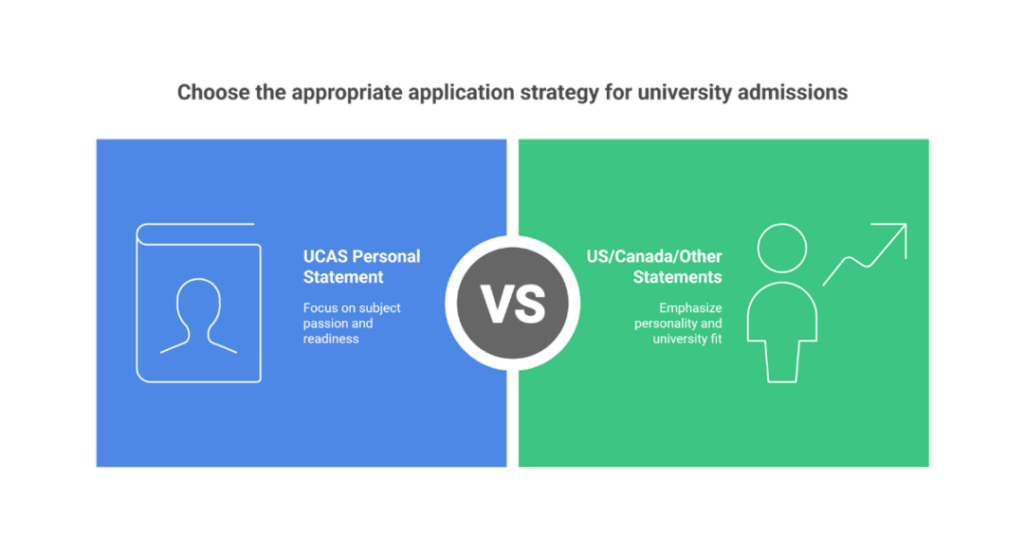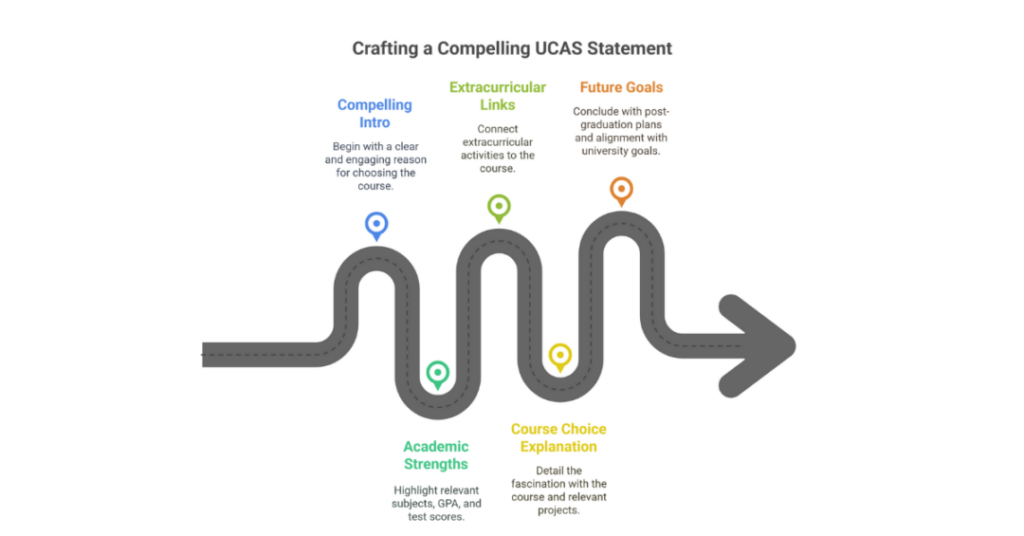3 June 2025
8 minutes read
How to Write a UCAS Personal Statement: A Complete Guide for Indian Students

Key Takeaways
- How to write a UCAS personal statement starts with clarity, focusing on your chosen subject, real experiences, and future goals.
- Most Indian students fail to stand out by using generic or ChatGPT-heavy content, keep it authentic and concise.
- Use a clear structure and expert help like Ambitio to craft a statement that actually gets you noticed.
Only 7% of Indian students get noticed by UK universities solely through their UCAS personal statement; most never make it past the first read. Why? Because many sound generic, rushed, or worse, written by ChatGPT without editing.
The truth is, writing a personal statement isn’t about perfection; it’s about authenticity, relevance, and clarity. If you’re an Indian student wondering how to write a UCAS personal statement that actually gets read, this guide will show you how to do it right in 2025.
What is a UCAS Personal Statement and Why Does it Matter?
A UCAS personal statement is a 47 line section of your university application that gives you the chance to get noticed for the unique talents and experiences you bring. Whether you’re an international student from India or the UK, you write one personal statement for all courses you apply to.
It must show your interest in the course, relevant skills, work experience, and leadership. For Indian students wondering how to write a UCAS personal statement, this is your opportunity to stand out.
Key Differences Between UCAS and Other Country’ Statements
Unlike US or Canadian applications, the UCAS personal statement is one document for all courses, not tailored to a particular university. For Indian students, this often leads to confusion: how do you write your personal statement once, stay relevant, and still stand out?

The key lies in understanding the structure, intent, and tone of a great UCAS personal statement compared to others. Here’s a breakdown to help with your UCAS personal and global university application approach:
| Criteria | UCAS Personal Statement (UK) | US/Canada/Other Countries |
|---|---|---|
| Application Format | One statement for all choices in the UCAS application | Separate essays for each university |
| Focus Area | Heavily focused on chosen subject/course or subject you’re applying | Emphasizes personality, personal experiences, and university fit |
| Mentioning Universities | Should not mention a particular university | Expected to tailor to each particular university |
| Word/Character Limit | Character count: 4000 characters or maximum of 47 lines | Word count: Varies widely (500–650 words typically) |
| Tone and Language | Academic, concise, focused on enthusiasm for the subject | Personal, reflective, often more narrative and emotive |
| What to Include | Academic and personal journey, contribution to university life, and reasons for specific schools | Show university admissions how you’ll contribute to campus, and succeed in your career in this area |
| Goal | Show admissions tutor your passion for the subject and readiness to study at university | Show university admissions how you’ll contribute to campus, succeed in your career in this area |
| Personalisation | One-size-fits-all—must work across all university courses chosen | Highly personalised—customised to each institution |
| Change in Format (2025–2026) | Personal statement is changing to structured questions by 2026 entry | Still essay-based, with prompts or free response |
What should Indian students know before they start a UCAS personal statement?
Before Indian students dive into how to write a UCAS personal statement, they must understand the structure, tone, and expectations set by UK universities. Unlike school essays, this section of your UCAS application is not just about grades, it’s your opportunity to talk directly to admissions tutors and show why you want to study your chosen subject at a UK uni. Here are a few crucial things Indian students should know before they begin:
- Stick to the character limit: You get a maximum of 4,000 characters and 47 lines; your personal statement must be concise, not bloated.
- Course-First, University-Second: A UK-Specific Approach: Since you apply to multiple universities, do not mention any by name. Stay focused on the course or subject you want to study.
- Show interest in the subject you’re applying for: Discuss what sparked your enthusiasm for your chosen subject area and what you’ve done to explore it, like reading a lot, projects, or relevant activities.
- Avoid generic ChatGPT fluff: Universities and colleges want personal experiences, not vague lines they’ve read in many personal statements. Make your personal statement stand out.
- Structure matters: The opening paragraph should grab attention, and the end of your personal statement section should reflect growth and readiness to start university life.
- Relevance over drama: Only include in your personal statement what directly ties to your academic and career goals. Showcase enthusiasm for your current field and leadership skills when applicable.
- Use personal statement guides and examples wisely: Don’t copy. Use examples of how other students wrote as inspiration to make your personal statement reflect your truth.
- Remember the goal: Your personal statement is a chance to convince the admissions tutor that you’re ready for this application to study and deserve a place on the course.
How to start a UCAS Personal Statement?
To start a UCAS personal statement that stands out, Indian students must avoid clichés and AI-written intros already using ChatGPT. Begin with a moment or insight that shows why you want to study this subject.
A good personal statement grabs attention from the first line and sets up the section of your personal statement colleges want to see. This part of the application is your chance to show how you studied the subject and will contribute to university life in 2025 entry.
What is the UCAS Personal Statement Template?
Before Indian students jump into how to write a UCAS personal statement for university applications, it’s helpful to follow a proven structure used by those who got into top UK universities like the University of Oxford, Imperial College London, and London School of Economics and Political Science.

This section of the application process must clearly explain your interest in the subject at university, your background, and your goals. Here’s a step-by-step personal statement template with practical tips:
Start with a Compelling Introduction
Open with a clear reason for choosing your course. Avoid generic phrases. Whether you’re applying to University College London or University of Cambridge, admissions officers are reading your personal statement for clarity, motivation, and originality. Mention what sparked your passion for the nature of the course.
Highlight Academic Strengths and Subjects
Discuss relevant subjects from school or college, your GPA, and achievements. If you’ve taken standardized tests like IELTS, TOEFL, GRE, or GMAT, briefly highlight those too. Include in your answers how these helped prepare you for the academic rigour of UK universities.
Link Extracurriculars with Course Relevance
Show how your extracurricular activities connect to the course. It’s not enough to say you volunteered—explain how it deepened your understanding of the subject and built essential skills. This is where a personal statement that stands really begins to shine.
Explain Why You Chose the Course
Be specific about the subject at university you’re applying to. Discuss what fascinates you about the nature of the course, and if you’ve done any relevant projects or certifications, mention them. Top unis like Imperial College London and LSE want genuine interest, not fluff.
End with Future Goals and a Strong Conclusion
Wrap it up with what you plan to do post-graduation. This section of your personal statement should reflect confidence, clarity, and contribution to the university. Show how your background and goals align, so they’re convinced to offer you a place.
How to end a UCAS Personal Statement?
To end your UCAS personal statement effectively, Indian students should focus on clarity, ambition, and fit. Summarise why you’re ready to study the subject and how it aligns with your future goals. Avoid repeating earlier points; use this section to reinforce confidence and maturity.
One of the best personal statement tips is to use strong closing lines that leave an impression within the allowed characters and write a personal summary that reflects who you are and why you’re ready for uni.
UCAS Personal Statement Examples for University and College Applications
When Indian students search for how to write a UCAS personal statement, they often find vague or AI-heavy samples that feel disconnected from reality. But a good personal statement isn’t about sounding overly polished, it’s about showing who you are, what drives you, and why you’re ready to contribute to university life.
Below is a real, impactful 500-word example tailored for competitive UK university courses, followed by analysis to help you learn and improve your own.
UCAS Personal Statement Example (Computer Science)
Since childhood, I have been fascinated by how systems work—from the logic behind mobile apps to the algorithms that power real-time recommendations. This curiosity deepened during school when I built a basic chatbot using Python. I knew then that I wanted to study Computer Science, not just as a subject but as a gateway to innovation. My passion for computing isn’t rooted in code alone but in its capacity to solve real-world problems and improve lives.
At school, I consistently ranked in the top 5% of my class in Maths and Physics, subjects that taught me structured thinking and analytical reasoning, skills essential for Computer Science. My project on “Data Compression Using Huffman Coding” received distinction in our school’s science exhibition and was later published in a regional student journal. This experience gave me a taste of applied logic and problem-solving and pushed me to explore more.
Outside academics, I co-founded our school’s coding club. As a lead member, I mentored younger students in Scratch, HTML, and basic JavaScript. We created projects that addressed community challenges, like a website for local NGO volunteer sign-ups and a water usage tracker for homes. These experiences helped me connect code with purpose.
My interest goes beyond classrooms. I completed online certifications in AI and data structures through Coursera and Harvard’s CS50 course. I’m currently working on a passion project that uses machine learning to detect fake news. Though still a work in progress, the project has taught me the importance of clean datasets, ethical AI, and human-centred design. It’s also given me hands-on experience in Python, TensorFlow, and real-world debugging.
I want to study Computer Science at a top UK university because the curriculum goes beyond theory. I’m particularly drawn to how universities like the University of Oxford, University College London, and Imperial College London combine research, interdisciplinary learning, and societal impact. The opportunity to collaborate with professors and peers from around the world will challenge me and help me grow.
Looking ahead, I aim to work in the field of ethical AI, helping shape technologies that are fair, transparent, and responsible. With my background, curiosity, and the right university environment, I believe I can contribute meaningfully to both campus and society.
I’m excited for this next chapter, to study this subject, engage in university projects, and be part of a learning community that celebrates diversity, discovery, and development. This is not just a course for me; it’s a step toward the future I want to build.
What Works and Why
- Clear Passion: Opens with a personal story and consistent theme of curiosity.
- Academic Relevance: Strong subject-specific examples with grades, projects, and skills.
- Real-World Application: Shows how computing applies to real life through volunteer work and projects.
- Targeted Fit: Mentions specific universities naturally without sounding forced.
Improvements You Can Learn From
- Could briefly mention soft skills (like teamwork or communication).
- The conclusion could tie back more strongly to the opening story.
- One line about managing studies with extracurriculars would round out the picture.
Conclusion
Mastering how to write a UCAS personal statement is a game-changer for Indian students aiming to study at top UK universities. It’s not just about writing well—it’s about telling your story with clarity, relevance, and confidence.
If you’re feeling stuck, overwhelmed, or just want expert guidance, Ambitio has your back. From personalized mentorship to profile building that actually gets you noticed, we turn confusion into clarity.
Want a UCAS personal statement that makes admissions tutors say YES? Join Ambitio today and build a future that speaks for itself, one word at a time.
FAQs
What is a UCAS personal statement and why is it important?
A UCAS personal statement is your chance to show universities why you want to study your chosen subject and why you’d make a great student, making it a key part of your application.
How long should my UCAS personal statement be?
When considering how to write a UCAS personal statement, remember it must be no longer than 4,000 characters or 47 lines, whichever comes first.
What structure should I follow when writing a UCAS personal statement?
Use a structure that covers your motivation for the course, your academic background, relevant experiences, skills, achievements, and a strong conclusion.
What should I include to make my UCAS personal statement stand out?
Include your passion for the subject, specific examples of achievements, relevant skills, and unique experiences that show your suitability.
How do I start writing a UCAS personal statement?
Start early, brainstorm your ideas, and draft everything you want to include before refining your statement for clarity and impact.
Can I use the same UCAS personal statement for multiple courses?
You submit one statement for all courses, so ensure it is relevant to each course you’re applying for, highlighting common interests or skills
What are common mistakes to avoid when writing a UCAS personal statement?
Avoid clichés, exaggerations, lists without explanation, and always proofread for grammar and spelling errors before submitting

You can study at top universities worldwide!
Get expert tips and tricks to get into top universities with a free expert session.
Book Your Free 30-Minute Session Now! Book a call now




























